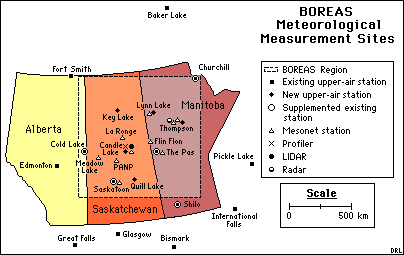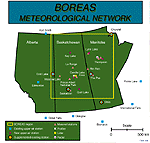
The Canadian Upper-Air Measurement Network (augmented for BOREAS)
 The BOREAS Information System
The BOREAS Information System
P.I.(s): Alan Barr--Atmospheric Environmental Service (AES)
Objectives: Provide large scale definition of the atmosphere for scientific research for by supplementing the existing Atmospheric Environment Service (AES) aerological network, both temporally and spatially. Establish 3 or 4 additional aerological stations with communications. Coordinate with AES for additional releases from existing stations. Assure that observations are being made according to established procedures and reach national and international communication systems in real time.

 BOREAS Meteorological Network (big)
BOREAS Meteorological Network (big)
Objectives:
Provide large scale definition of the atmosphere by supplementing the existing Environment Canada aerological network, both temporally and spatially.
 Three additional aerological stations were established during IFCs in 1993 and 1994, and the FFC Thaw in 1994. Additional releases were arranged at 5 existing stations in 1993 and 4 stations in 1994. Two cooperative sites (WQH and YYL) provided flights in 1993, and one cooperative site (YYL) provided some flights during IFC-2 in 1994.
Three additional aerological stations were established during IFCs in 1993 and 1994, and the FFC Thaw in 1994. Additional releases were arranged at 5 existing stations in 1993 and 4 stations in 1994. Two cooperative sites (WQH and YYL) provided flights in 1993, and one cooperative site (YYL) provided some flights during IFC-2 in 1994.
Types of Data Collected, Equipment Used:
Standard flights: Vertical profiles of temperature, moisture, and wind direction and speed. Reprocessed flights:
Vaisala and GMD radiosondes (standard Environment Canada equipment) were used. Observations were made according to existing Environment Canada procedures, and provided to national and international communications systems in real time. Observations were reprocessed to provide increased resolution for stations within the BOREAS region before being provided to BORIS.
Summary of Places and Times of Measurements:
Places; see Experiment Plan Version 3.0, table 3.2.2a. Times; generally two/day (0000Z and 1200Z); except generally three/day (+1800Z) during IFCs at YKJ, YYQ, YQD, YXE, and WIQ; and generally seven/day (1200Z + every two hours) at YTH and WLZ.
 A detailed listing of flights made at Candle Lake and Thompson that were reprocessed and provided to BORIS in 1994 is available in BORIS in the report "Preliminary Summary of BOREAS Upper-Air Soundings Candle Lake and Thompson 1994 Intensive Field Campaigns" by Barr and Betts (paper copy only).
A detailed listing of flights made at Candle Lake and Thompson that were reprocessed and provided to BORIS in 1994 is available in BORIS in the report "Preliminary Summary of BOREAS Upper-Air Soundings Candle Lake and Thompson 1994 Intensive Field Campaigns" by Barr and Betts (paper copy only).
Known Problems or Caveats:
The Upper-Air data has few gaps and little data are missing. Notably, there are no wind data at Thompson between 24 May and 6 June 1994 due to a hardware malfunction.
 Comparison of 2 hour serial soundings by Barr and Betts shows a high degree of internal consistency.
Comparison of 2 hour serial soundings by Barr and Betts shows a high degree of internal consistency.
 Field and laboratory evaluation by Barr and Betts shows near-zero mean bias errors for wind speed and direction, and high precision for relative humidity. However, also shown was a negative bias for relative humidity, reaching a maximum at about 70% relative humidity of about 10%.
Field and laboratory evaluation by Barr and Betts shows near-zero mean bias errors for wind speed and direction, and high precision for relative humidity. However, also shown was a negative bias for relative humidity, reaching a maximum at about 70% relative humidity of about 10%.
 Vaisala wind profiles in the lowest 1 km are often suspiciously smooth, as though interpolated from the surface wind to some first measured wind at about that height. Also, a few soundings have serious oscillations in wind direction.
Vaisala wind profiles in the lowest 1 km are often suspiciously smooth, as though interpolated from the surface wind to some first measured wind at about that height. Also, a few soundings have serious oscillations in wind direction.
 The surface wind observations at Candle Lake were made subjectively, and are often questionable.
The surface wind observations at Candle Lake were made subjectively, and are often questionable.
AFM Overview || AFM-1 | AFM-2 | AFM-3 | AFM-4 | AFM-5 | AFM-6
AFM-7 | AFM-8 | AFM-9 | AFM-11 | AFM-12 | AFM-13 | AFM-14 | AFM-15
 Send a data request to the BOREAS Data Manager (BOREAS Investigators only)
Send a data request to the BOREAS Data Manager (BOREAS Investigators only)
E-Mail a comment on this page to the curator 
Send e-mail to Keith Kaminsky, the BORIS representative for the AFM group 
Return to the AFM Overview
Return to the BOREAS Science Groups Overview
Return to the BOREAS Home Page
Last Updated: October 20, 1997